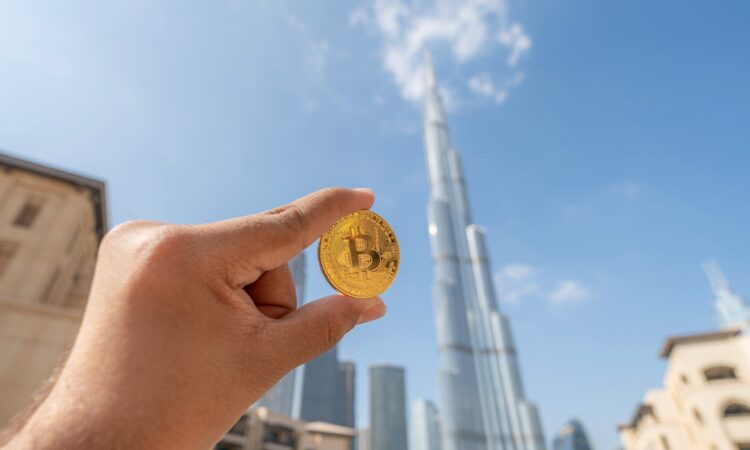
Table of Contents
Show more
Show less
Forbes Advisor has provided this content for educational reasons only and not to help you decide whether or not to invest in cryptocurrency. Should you decide to invest in cryptocurrency or in any other investment, you should always obtain appropriate financial advice and only invest what you can afford to lose.
Despite its reputation as a conservative region Dubai, along with the wider UAE, does permit cryptocurrency trading. And with no personal income tax or capital gains taxes to pay, successful investors also get to keep more of any profits they might make.
Here’s our guide for anyone in Abu Dhabi, Dubai, Sharjah, Ajman, Umm Al Quwain, Ras Al Khaimah or Fujairah who might be looking to invest in bitcoin.
Bitcoin explained
Bitcoin is the world’s first, oldest and largest cryptocurrency. It’s been around for 15 years. In that time it’s been worth as little as AED2 and as much as AED264,000, with many peaks and troughs in between, illustrating its volatility. To learn more about the crypto asset, see our bitcoin guide.
Bitcoin 5-Year Price History
Creating a crypto exchange account
Investors typically buy and sell bitcoin and other cryptocurrencies via crypto exchanges. These websites and apps are designed to make it easy for speculators to track price movements and execute trades.
We named eToro and Uphold as two of the best crypto exchanges in the market, based on the number of coins available to trade, features and trading fees. But there are countless other exchanges to choose from, each with their own offering and availability.
Whichever exchange an investor chooses, bitcoin is currently the most widely traded cryptocurrency on the market, so they’re unlikely to find an exchange that doesn’t support it.
Opening an account with an exchange involves sharing some personal information and passing some identity verification checks.
This usually means uploading a photograph of an official document such as an Emirates ID, and following a series of prompts in front of a webcam or smartphone camera.
Funding the account
Once a user has created an account, they need to fund it with a fiat currency in order to start trading – whether that’s United Arab Emirates Dirham (AED) US Dollars (USD), Pounds Sterling (GBP) or any other currency.
One bitcoin currently trades at around AED229,290 (or $62,426 or £50,000) which means many bitcoin investors will be buying just a share of a bitcoin, rather than an entire bitcoin.
Whatever cryptocurrency a user is buying, there’s typically a minimum deposit of around £10. Once the account is credited, the user can begin trading bitcoin.
Making trades
To make a trade, users must navigate to the bitcoin page within their chosen exchange’s website or smartphone app.
On that page, they can enter how much they want to spend on bitcoin and see a preview of how many bitcoins they’ll get in return, minus any transaction fees charged by the exchange.
Once happy with the transaction preview, they can confirm the trade. The user’s account will then be credited with bitcoin and the fiat currency they’ve spent will be debited.
In making the trade, a record will be created that will be added to the bitcoin blockchain, proving that it happened and that the user is entitled to the bitcoin they purchased.
Storage
Bitcoin doesn’t need to be stored in the same way that one might secure cash in a safe. Since bitcoin doesn’t physically exist, the record of the transaction in the blockchain is what ties the asset to the user.
In order to do anything with that bitcoin,whether that’s selling it or moving it to another location, a user needs to digitally sign the transaction with their private and public keys.
These keys are long alphanumeric strings of text that must be entered to make a trade.
As such, these keys need to be stored. In the case of the private key, which should be known only to the user, they must be stored securely. This is because whoever holds the keys effectively holds the crypto.
Most exchanges offer key storage – sometimes called a crypto wallet – with every account. This is convenient because it means a single sign in for both trading and wallet. The downside is that hackers target these ‘custodial’ wallets to steal the keys.
An alternative can be to use either a third party wallet provider, putting some distance between the place where a user trades and stores their keys, or by using an offline ‘cold’ wallet.
Third party wallet providers are also targets for hackers, but are slightly less lucrative in terms of scale. They also charge fees and mean users have another set of login credentials to keep safe.
Offline ‘cold’ wallets are storage devices that plug into web-connected devices. That ‘air gap’ between the internet and the storage device holding the keys offers an additional layer of security against hackers, though that is somewhat compromised when inserted into a laptop or phone.
Cold wallets put the onus of remembering security credentials on the user, meaning someone could lock themselves out of their wallets and freeze themselves out of their crypto holdings if they forgot their login information.
Choosing a storage method is often viewed as a balance between security and accessibility.
Cryptocurrency is unregulated in the UK. The UK regulator, the Financial Conduct Authority, has repeatedly warned investors that they risk losing all their money if they buy cryptocurrency, with no possibility of compensation.






